Devi Suktam‚ a sacred hymn from the Rigveda‚ is a revered text in Hinduism‚ dedicated to Goddess Devi (Vak). It consists of 8 verses‚ praising her divine manifestations and role in creation‚ making it a cornerstone of spiritual practices and rituals.
Overview of Devi Suktam
Devi Suktam‚ also known as Vaak Suktam‚ is a sacred Vedic hymn from the Rigveda (RV 10.125). It consists of 8 verses‚ dedicated to Goddess Devi (Vak)‚ a manifestation of the divine feminine. The hymn praises her role in creation‚ preservation‚ and destruction‚ highlighting her universal power. It is often recited at the end of Devi Mahatmya and is part of the Durga Saptashati. The text emphasizes the goddess’s omnipresence and her embodiment of light‚ wisdom‚ and energy. Devi Suktam is not only a spiritual chant but also a philosophical treatise‚ symbolizing the non-dualistic realization of the ultimate reality. Its verses are deeply revered in Hinduism‚ making it a cornerstone of rituals‚ meditation‚ and worship. The hymn’s significance extends to its recitation in ceremonies like Navratri‚ further cementing its importance in spiritual practices.
Significance of Devi Suktam in Hinduism
Devi Suktam holds profound significance in Hinduism as a powerful hymn dedicated to the divine feminine‚ embodying the universal energy of Goddess Devi. It is a celebration of her role in creation‚ preservation‚ and destruction‚ symbolizing her omnipotence and cosmic influence. The hymn is deeply rooted in Vedic and tantric traditions‚ often recited during rituals like Navratri and Durga Puja to invoke her blessings. Its verses are considered a source of spiritual enlightenment‚ guiding devotees toward self-realization and non-dualistic understanding. Devi Suktam is also integral to the Durga Saptashati‚ reinforcing its connection to Goddess Durga and her manifestations. By chanting this sacred text‚ believers seek to connect with the divine feminine‚ fostering inner peace‚ strength‚ and spiritual growth. Its recitation is believed to ward off negativity and bring prosperity‚ making it a cherished part of Hindu worship and meditation.
Structure and Composition of Devi Suktam
Devi Suktam‚ found in the Rigveda (RV 10.125)‚ is a concise yet profound hymn comprising 8 verses. It is dedicated to Goddess Vak‚ a manifestation of the divine feminine‚ and is also known as the Vaak Suktam. The hymn is structured to glorify the goddess’s role in creation‚ her cosmic influence‚ and her divine manifestations. Each verse intricately weaves themes of devotion‚ spiritual realization‚ and the universal energy of the goddess. The composition is poetic yet philosophical‚ reflecting the Vedic tradition’s reverence for the feminine principle. It is often recited in rituals and ceremonies‚ particularly at the end of the Devi Mahatmya‚ and is considered a part of the Durga Saptashati. The hymn’s structure and composition make it accessible for recitation and meditation‚ ensuring its enduring relevance in Hindu spiritual practices. Its availability in PDF format further enhances its accessibility for modern devotees.
Origin and Background
Devi Suktam‚ an ancient Vedic hymn from the Rigveda (RV 10.125)‚ is dedicated to Goddess Vak‚ a form of Devi. It is also known as the Vaak Suktam and is deeply rooted in Hindu scripture‚ often recited in rituals and ceremonies‚ particularly at the end of the Devi Mahatmya. Its historical significance is profound‚ making it a cornerstone of spiritual practices and devotion to the divine feminine.
Historical Context of Devi Suktam
Devi Suktam‚ also known as Vaak Suktam‚ is an ancient hymn from the Rigveda (RV 10.125)‚ composed by the sage Vasishtha. It is dedicated to Goddess Vak‚ a form of Devi‚ symbolizing the divine feminine and cosmic energy. The hymn is deeply rooted in Vedic tradition and is often recited in rituals and ceremonies‚ particularly at the end of the Devi Mahatmya. Historically‚ it has been a part of the Durga Saptashati‚ a significant text in Hinduism‚ and is also referred to as Tantroktam Devi Suktam. Its composition reflects the philosophical and spiritual ideals of the Vedic period‚ emphasizing the power and reverence of the divine feminine. Over time‚ it has become integral to worship and spiritual practices‚ particularly during festivals like Navratri‚ celebrating Goddess Durga and her manifestations.
Devi Suktam in the Rigveda
Devi Suktam‚ also known as Vaak Suktam‚ is a sacred hymn from the Rigveda (RV 10.125)‚ consisting of 8 verses. It is dedicated to Goddess Vak‚ a form of Devi‚ symbolizing the divine feminine and cosmic energy. The hymn is deeply rooted in Vedic tradition and is often recited in rituals and ceremonies‚ particularly at the end of the Devi Mahatmya. Historically‚ it has been a part of the Durga Saptashati‚ a significant text in Hinduism‚ and is also referred to as Tantroktam Devi Suktam. Its composition reflects the philosophical and spiritual ideals of the Vedic period‚ emphasizing the power and reverence of the divine feminine. Over time‚ it has become integral to worship and spiritual practices‚ particularly during festivals like Navratri‚ celebrating Goddess Durga and her manifestations.
Connection to Devi Mahatmya
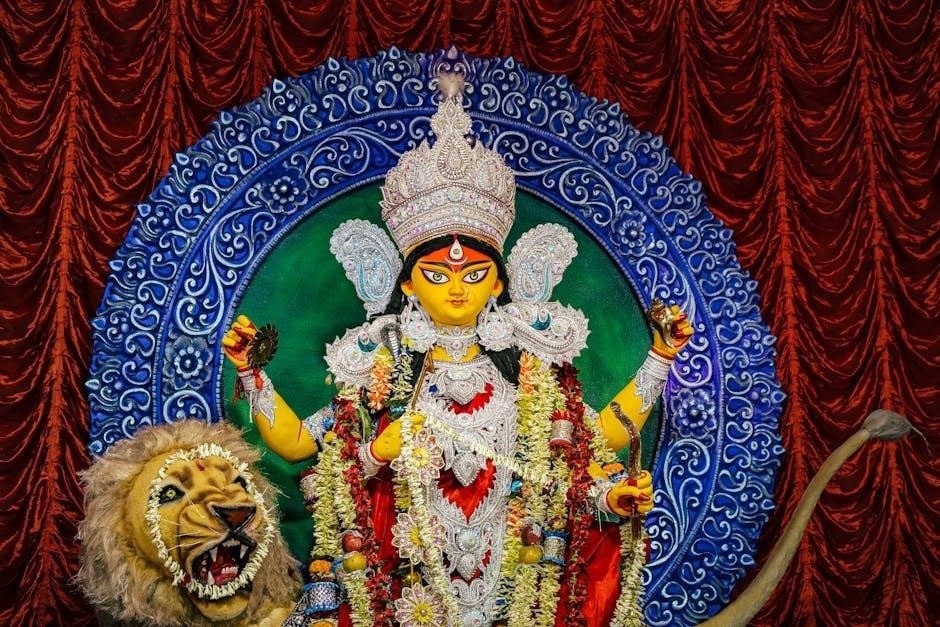
Devi Suktam is deeply connected to the Devi Mahatmya‚ a revered text in Hinduism that glorifies the divine feminine. It is traditionally recited at the conclusion of the Devi Mahatmya‚ serving as a powerful culmination of the narrative. The hymn is also known as Tantroktam Devi Suktam and is part of the Durga Saptashati‚ a significant text dedicated to Goddess Durga. The connection between the two texts lies in their shared theme of celebrating the divine power of the goddess‚ who embodies strength‚ wisdom‚ and creation. Devi Suktam complements the Devi Mahatmya by summarizing the goddess’s divine attributes and her role in maintaining cosmic order. Together‚ they form a complete narrative of devotion‚ worship‚ and spiritual reflection‚ making them integral to rituals and ceremonies‚ especially during Navratri celebrations.
Key Verses and Their Meanings
Devi Suktam features profound verses praising the divine feminine. Each verse highlights the goddess’s omnipresence‚ power‚ and nurturing qualities‚ offering deep spiritual insights into her cosmic role and eternal essence.
Verse 1: “Om Aham Rudrebhirvasubhiścarāmyahamādityairuta Viśvadevaiḥ”
This verse‚ the opening of Devi Suktam‚ declares the goddess’s omnipresence and divine identity. She proclaims herself as the essence of Rudra‚ Vasus‚ and Adityas‚ embodying cosmic forces and universal deities. The verse symbolizes her all-pervasive nature‚ asserting her role as the dynamic energy behind creation and sustenance. By identifying with these powerful deities‚ the goddess establishes herself as the supreme‚ indivisible power governing the universe. This verse is a powerful affirmation of the feminine divine‚ highlighting her multifaceted manifestations and her inseparability from the cosmic order. It sets the tone for the rest of the hymn‚ which elaborates on her glory and reverence. The verse is often recited in rituals to invoke her blessings and connect with her divine energy.
Verse 2: “Yā Devi Sarva-Bhūteṣu Viṣṇu-Māyeti Śabditā”
This verse glorifies the goddess as the universal energy present in all beings‚ embodying the divine illusion of Vishnu‚ known as Viṣṇu-Māyā. It emphasizes her role as the reliever of suffering and the eternal‚ radiant force. The verse proclaims that she is the embodiment of light and the essence of devotion‚ deserving continuous reverence. By invoking her as the universal mother‚ it highlights her nurturing and protective aspects. This verse is deeply philosophical‚ underscoring the goddess’s omnipresence and her role in sustaining creation. It is often recited to seek her blessings and guidance‚ reinforcing the belief in her divine grace. The verse also symbolizes the unity of all existence under her benevolent care‚ making it a cornerstone of devotion and spiritual reflection in Hinduism. Its recitation is believed to bring solace and enlightenment to the devotee.
Verse 3: “Namo Devyai Mahadevyai Śivāyai Satatam Namaha”
This verse is a heartfelt dedication to the goddess‚ offering perpetual homage to her supreme form. It invokes Mahadevyai‚ the great goddess‚ and Śivāyai‚ symbolizing her benevolent and nurturing aspects. The phrase “Satatam Namaha” emphasizes continuous reverence‚ reflecting the eternal nature of devotion. This verse is often recited in rituals and daily worship to seek her blessings and protection. It underscores the goddess’s cosmic role‚ embodying both creation and destruction‚ while also highlighting her compassionate side. The verse is deeply symbolic‚ representing the unity of divine energy and the devotee’s surrender to her will. Its recitation is believed to bring spiritual solace‚ strength‚ and alignment with the divine feminine force. It is a powerful expression of faith and devotion‚ resonating deeply in Hindu spiritual practices.
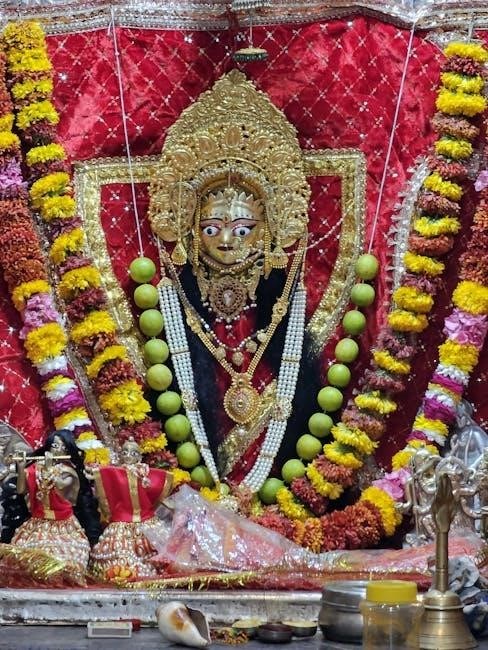
Spiritual Significance
Devi Suktam holds profound spiritual significance‚ embodying devotion to the divine feminine. It is a powerful tool for meditation‚ worship‚ and connecting with Goddess Devi’s cosmic energy‚ fostering inner peace and strength.
Role of Devi Suktam in Spiritual Practices
Devi Suktam plays a pivotal role in spiritual practices‚ serving as a powerful tool for meditation‚ worship‚ and self-realization. It is often recited during pūjā ceremonies and rituals to invoke the divine energy of Goddess Devi. The hymn is believed to connect devotees with the cosmic feminine force‚ fostering inner peace‚ strength‚ and spiritual growth. Its verses are chanted to seek blessings‚ protection‚ and guidance‚ making it an integral part of daily worship and meditation. Many practitioners incorporate Devi Suktam into their spiritual routines to align with the divine and experience transcendence. Its recitation is particularly significant during festivals like Navratri‚ where it is chanted to honor the various manifestations of Goddess Durga. This sacred text is a cornerstone of Hindu spirituality‚ offering a profound way to deepen one’s connection with the divine feminine energy.
Symbolism and Philosophy in Devi Suktam
Devi Suktam is rich in symbolism‚ representing the divine feminine force that permeates the universe. It embodies the philosophy of non-dualism‚ where the ultimate reality is beyond duality‚ and the goddess is the essence of all existence. The hymn symbolizes the cosmic energy of creation‚ preservation‚ and destruction‚ attributing these powers to the divine feminine. Through its verses‚ it conveys the idea that the goddess is both the creator and the created‚ transcending all boundaries; The text also reflects the Advaita Vedanta philosophy‚ emphasizing the unity of the individual self with the universal consciousness. The symbolism in Devi Suktam inspires devotees to realize the divine within themselves‚ fostering a deeper understanding of the interconnectedness of all beings and the ultimate reality.
Connection to Goddess Durga and Her Manifestations
Devi Suktam is deeply connected to Goddess Durga‚ celebrating her divine power and manifestations. It is often recited during Navratri and other Durga-related rituals‚ symbolizing her role as the protector and embodiment of cosmic energy. The hymn praises Durga’s various forms‚ such as Mahisasurmardini‚ the slayer of the buffalo demon‚ and her attributes of strength‚ compassion‚ and divine light. It also reflects her role in maintaining balance and order in the universe. The text is integral to the Durga Saptashati‚ a significant scripture in Hinduism‚ and is often chanted to invoke her blessings and protection. By honoring Durga through Devi Suktam‚ devotees connect with her universal energy and seek spiritual growth and empowerment.
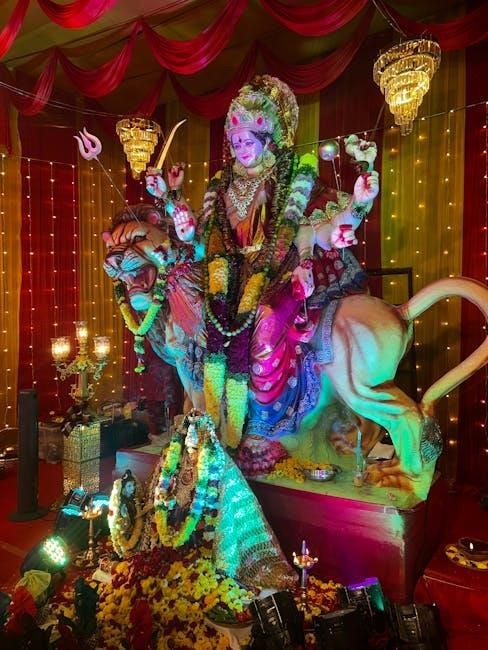
Devi Suktam in Rituals and Worship
Devi Suktam is integral to Hindu rituals‚ recited in pūjā ceremonies‚ Navratri celebrations‚ and daily worship. It is often chanted during meditation‚ invoking Goddess Durga’s divine energy and blessings for protection and spiritual growth.
Recitation of Devi Suktam in Puja Ceremonies
Devi Suktam holds a prominent place in Hindu pūjā ceremonies‚ particularly during Navratri and other Goddess-centric rituals. Its recitation is believed to invoke the divine energy of Goddess Durga‚ seeking her blessings for protection‚ prosperity‚ and spiritual growth. The hymn‚ comprising eight verses‚ is often chanted with devotion‚ accompanied by offerings such as flowers‚ incense‚ and lamps. It is considered a powerful means to connect with the divine feminine energy‚ embodying the essence of Goddess Devi. The recitation is typically performed by priests or devotees‚ adhering to traditional rituals and protocols. The hymn’s verses‚ praising Devi’s manifestations‚ are also used to express gratitude and seek her guidance in overcoming life’s challenges. Its inclusion in pūjā ceremonies underscores its significance in Hindu spiritual practices and worship.
Importance in Navratri Celebrations
Devi Suktam plays a pivotal role in Navratri celebrations‚ a nine-day festival honoring Goddess Durga and her nine divine forms. The hymn is recited to invoke her blessings‚ seeking strength‚ prosperity‚ and spiritual enlightenment. During Navratri‚ devotees often chant Devi Suktam as part of rituals‚ especially during the final days‚ to connect with the divine feminine energy. Its verses‚ glorifying Devi’s power and grace‚ resonate deeply with the festival’s theme of triumph over adversity. Many temples and households include it in their pūjā ceremonies‚ believing it amplifies the spiritual benefits of worship. The hymn’s recitation is also believed to purify the environment and bring harmony to those who chant it with devotion. Thus‚ Devi Suktam is an integral part of Navratri observances‚ enriching the spiritual experience of participants.
Devi Suktam in Daily Worship and Meditation
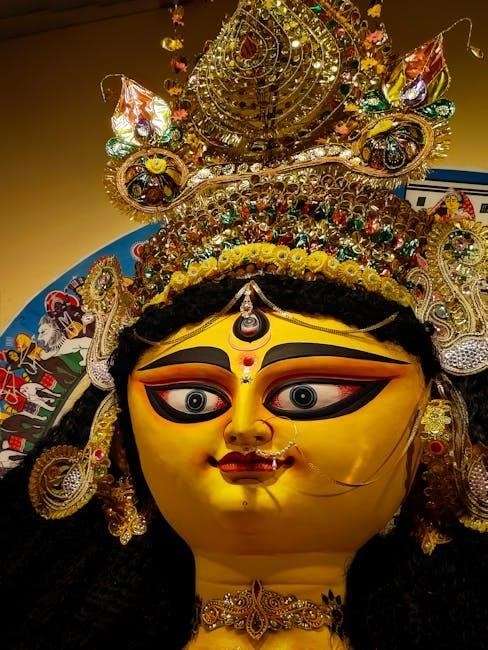
Devi Suktam is an integral part of daily worship and meditation for many devotees‚ offering a profound way to connect with the divine feminine energy. Its verses‚ rich in spiritual significance‚ are often recited during morning and evening pūjā ceremonies to invoke Goddess Devi’s blessings. The hymn is believed to bring inner peace‚ clarity‚ and strength‚ making it a popular choice for meditation practices. Many practitioners incorporate Devi Suktam into their daily routines to cultivate devotion and spiritual growth. Additionally‚ its recitation is thought to purify the environment and attract positive energy. The availability of Devi Suktam in PDF format has made it easily accessible for individuals to include it in their personal worship and meditation‚ ensuring its timeless wisdom continues to inspire and guide seekers of truth.
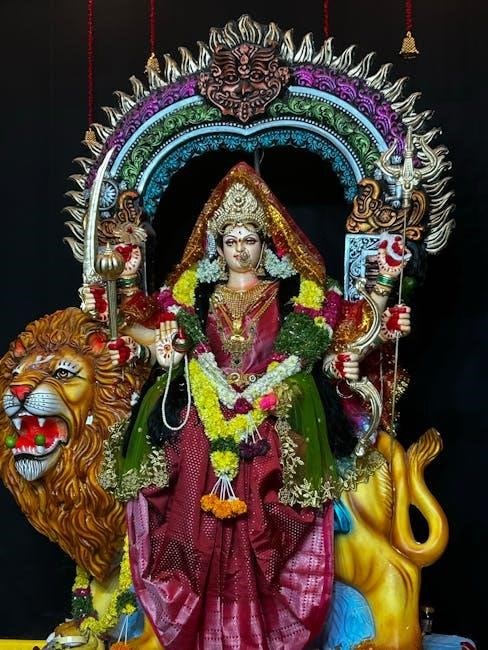
PDF Version of Devi Suktam
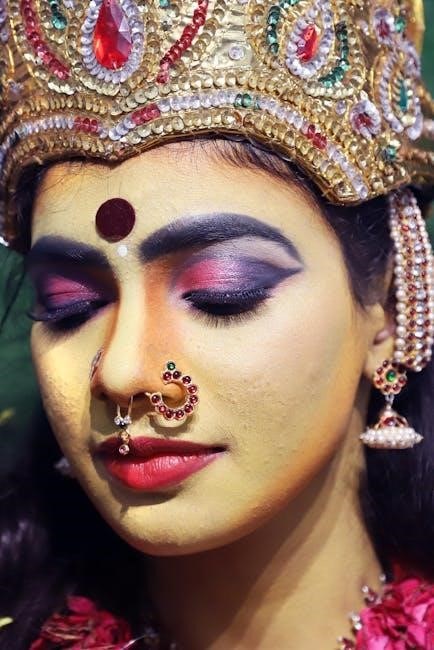
The Devi Suktam PDF is widely available‚ featuring the original Sanskrit text‚ English translations‚ and transliterations. It is a valuable resource for spiritual practices and academic study‚ free to download.
Availability of Devi Suktam in PDF Format
The Devi Suktam PDF is widely accessible online‚ offering a convenient way to explore this sacred hymn. It is available on various platforms‚ including religious websites‚ digital libraries‚ and e-book repositories. Many sources provide the text in both Sanskrit and English‚ along with transliterations and translations‚ making it accessible to a broader audience. Some versions also include commentary and philosophical insights‚ enhancing its spiritual and academic value. The PDF format ensures that the text is easily readable and sharable‚ making it a popular choice for devotees and scholars alike. Additionally‚ websites like Google Drive‚ Amazon‚ and religious portals often host free downloads‚ ensuring widespread availability. This digital accessibility has made the Devi Suktam more reachable than ever‚ fostering its study and recitation worldwide.

Features of the PDF Version
The Devi Suktam PDF is designed to enhance accessibility and understanding of this sacred hymn. It typically includes the original Sanskrit text‚ accompanied by English translations and transliterations‚ making it accessible to both scholars and devotees. Many versions feature detailed commentaries and explanations‚ providing deeper insights into the philosophical and spiritual significance of the verses. The PDF often includes introductory notes about the hymn’s origin‚ structure‚ and cultural importance. Some editions also incorporate audio links or recitation guides to aid in proper pronunciation and chanting. The layout is usually clean and user-friendly‚ with clear fonts and spacing for easy readability. Additionally‚ the PDF may include illustrations or sacred geometrical designs‚ further enriching the spiritual experience. These features make the Devi Suktam PDF a valuable resource for both spiritual practices and academic study.
Benefits of Accessing Devi Suktam in Digital Format
Accessing Devi Suktam in digital format offers numerous benefits‚ enhancing both convenience and spiritual practice. The PDF version is portable‚ allowing devotees to carry the sacred text on smartphones‚ tablets‚ or laptops‚ making it accessible anytime‚ anywhere. Digital formats also enable easy sharing‚ spreading the divine message widely. The ability to search for specific verses or meanings within the document saves time and facilitates deeper study. Additionally‚ digital versions often include hyperlinks‚ audio recitations‚ and interactive features‚ enriching the learning experience. The clean‚ readable layout and adjustable font sizes cater to individual preferences‚ ensuring comfort during extended reading or recitation. Furthermore‚ digital access reduces the need for physical storage‚ preserving the text while minimizing environmental impact. Overall‚ the Devi Suktam PDF serves as a modern‚ efficient tool for spiritual growth and education.
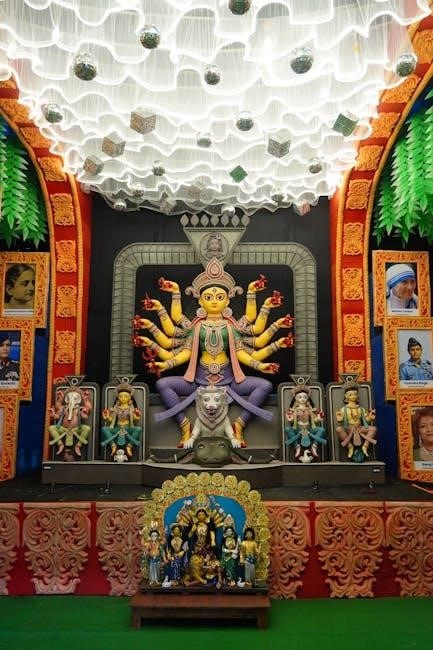
Downloading and Accessing the PDF
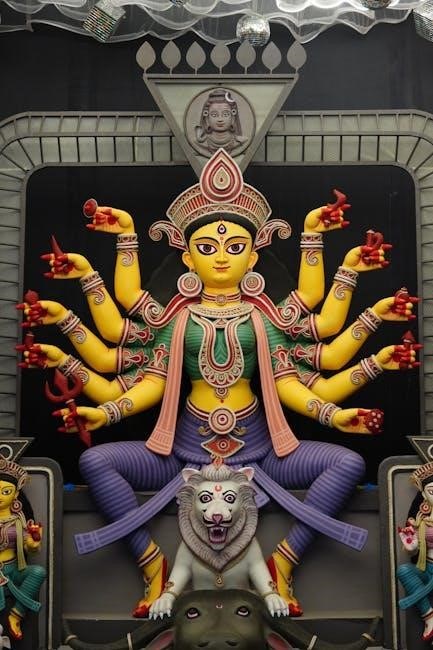
The Devi Suktam PDF is easily accessible online‚ offering free downloads from reliable sources like Archive.org. It features Sanskrit text‚ transliteration‚ and commentary‚ enhancing spiritual study and practice.
Reliable Sources for Downloading Devi Suktam PDF
Reliable sources for downloading the Devi Suktam PDF include websites like Archive.org‚ Shemaroo Bhakti‚ and Gitapress. These platforms offer free and authentic versions of the text‚ often with Sanskrit script‚ transliteration‚ and English translations. Additionally‚ spiritual websites like Babachants.com and DurgaSaptashati.com provide downloadable PDFs with commentary and explanations. Many of these sources ensure the text is presented in a user-friendly format‚ making it accessible for both spiritual practitioners and scholars. Always verify the authenticity of the source to ensure the PDF is accurate and respectful of the sacred text.
Guidelines for Proper Usage of the PDF
The Devi Suktam PDF is a sacred text and should be treated with reverence. It is recommended to use the PDF for personal spiritual growth‚ study‚ or worship purposes. Before reciting‚ one should maintain purity of mind and body‚ and ideally‚ recite it in a calm and clean environment. The text should be recited with proper pronunciation and respect‚ following traditional guidelines. Sharing the PDF is permissible for spreading spiritual knowledge‚ but it should be done without commercial intent. Always ensure the source is credible and the content is accurate. For rituals or group recitations‚ guidance from a qualified guru or scholar is advisable. The PDF format makes it accessible‚ but focus on the spiritual essence rather than mere digital convenience. Respect the intellectual property and ethical sharing practices while utilizing the Devi Suktam PDF.
Legal and Ethical Considerations for Sharing the PDF
Sharing the Devi Suktam PDF requires adherence to legal and ethical standards. Ensure the PDF is downloaded from credible sources with proper copyright permissions. Respect intellectual property rights and avoid unauthorized distribution for commercial purposes. The text is sacred‚ so share it responsibly‚ ensuring its sanctity is maintained. Verify the authenticity of the content before dissemination to prevent misinformation. Ethically‚ it is important to credit the original authors or publishers when sharing. Avoid altering or editing the content without proper authorization. Sharing for educational or spiritual purposes is encouraged‚ but always prioritize respect for the cultural and religious significance of the text. By following these guidelines‚ you contribute to preserving the integrity of Devi Suktam while making it accessible to others.
Devi Suktam is a profound Vedic hymn honoring Goddess Devi‚ essential for spiritual growth and worship. Its PDF availability ensures easy access for devotees‚ preserving its legacy.
Devi Suktam‚ a sacred hymn from the Rigveda‚ holds immense spiritual and cultural significance in Hinduism. It is dedicated to Goddess Devi‚ celebrating her divine manifestations and role in creation. Comprising eight verses‚ it is often recited in rituals‚ pujas‚ and Navratri celebrations‚ symbolizing devotion and reverence. The hymn emphasizes the goddess’s power‚ wisdom‚ and nurturing qualities‚ making it a cornerstone of spiritual practices. Its availability in PDF format has made it accessible to a global audience‚ ensuring its teachings and significance endure. Devi Suktam not only deepens spiritual understanding but also connects devotees to the divine feminine energy‚ fostering a sense of unity and transcendence. Its timeless message continues to inspire seekers of truth and enlightenment.
Final Thoughts on the Significance of Devi Suktam
Devi Suktam stands as a profound expression of devotion to the divine feminine‚ embodying the essence of Hindu spirituality. Its verses‚ rich in philosophical depth‚ highlight the goddess’s omnipresence and her role in sustaining the universe. As a part of the Rigveda‚ it bridges the ancient and the modern‚ offering timeless wisdom. The availability of Devi Suktam in PDF format has democratized access‚ allowing global seekers to connect with its sacred teachings. It is not just a hymn but a living tradition that inspires spiritual growth‚ fostering a deeper understanding of the divine. For those seeking enlightenment or solace‚ Devi Suktam remains a guiding light‚ transcending time and culture. Its significance lies in its ability to unite humanity in reverence for the eternal and universal principles it upholds.